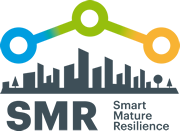SMR has completed and shared its latest tool, the Risk Systemicity Questionnaire (RSQ), which is now available to cities. The RSQ is an Excel based tool where users are asked to consider the relative likelihood of a broad range of risks in their cities. These risks are spread across 9 topics: health, climate change (air pollution), climate change (flooding), social inequalities, ageing (population), riots, immigration, social cohesion and social alienation and are considered as networks of interrelated risks. These networks of risks are presented as risk scenarios, some of which result in vicious cycles. Users progress through the tool by completing questions which ask them to consider whether defined risks scenarios are likely or not to occur in their cities.
Based on the responses to the questions contained in each of the topics of the RSQ, participants are provided with a relative risk score (an estimated risk level for the city) and an awareness score (the level of knowledge the city has about the possible risk scenarios). In addition to this, users can access policies recommendations that may be used to address those risk scenarios that are of most threat to the city.
Not only does completing the Risk Systemicity Questionnaire help cities to assess their exposure to risk, but it also indicates their level of awareness of risk and where cities should prioritise their efforts. The purpose of the questionnaire is for it to be used by groups of users with diverse areas of expertise so that it can prompt valuable discussions where different stakeholders’ experiences can be brought together to determine a city’s priorities to enable them to anticipate and appropriately respond to future challenges.







